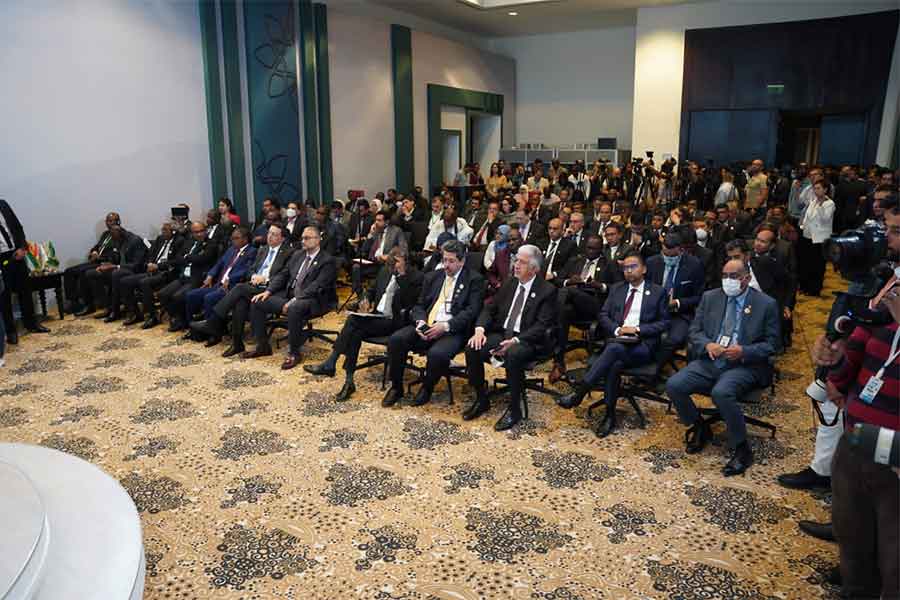The meetings were held under the theme: “Beyond Recovery: Resilience and Sustainability” in Sharm El-Shiekh for the first time since 1990s.
The meetings included the three-day-long private business sector forum where Egypt and the IsDB Group launched the Partners Coalition of Green Transition that includes prominent Egyptian companies in the fields of energy, transport, waste and energy recycling, real-estate development and sustainable financing.
The mission of the coalition is to encourage other companies to participate in a green transition in line with Egypt’s national development plans.
The meetings also highlighted the role the UN Climate Change Conference (COP27) will play in addressing the challenges and bottlenecks that developing African economies are suffering amid the ongoing global crises, especially the severe impacts related to the war in Ukraine.
To this end, the meetings witnessed the signing of 13 MoUs and letters of intentions as well as the inking of 50 cooperation documents between the IsDB and its member countries.
Hala El-Said, Egypt’s minister of planning and economic development and Egypt’s governor at the IsDB, stressed that adapting to climate change has become a major priority for Egypt, noting that the launch of Egypt Vision 2030 in 2016 included clear goals to increase the role of renewable energy and decrease use of coal.

“The government is also working hard on fulfilling a strategy to combat the new challenges such as climate change, water scarcity, rapid population growth, and achieving a green recovery from the effects of the coronavirus pandemic,” said El-Said.
The minister also stated that policies aimed at supporting the transition to a green economy and maintaining the sustainable use of natural resources come at the heart of the structural reforms programme launched by the state in 2021, highlighting the launch of the National Climate Change Strategy last May.
This strategy aims to reduce greenhouse gas emissions, adapt to the negative repercussions of climate change and provide financing, capacity building and technology transfer, she added.
“Egypt is putting in tremendous efforts to prepare and launch the national strategies for hydrogen, managing water resources, and protecting beaches. Egypt also adopts environmental sustainability standards that aim for green projects to reach 30 percent of the state’s investment plan for FY2021/2022, and 50 percent by FY2024/2025, and cooperates with the private sector to adopt these standards,” El-Said explained.
Regarding Egypt’s hosting of COP27, El-Said said that Egypt aims to achieve tangible progress in priority areas such as climate financing and adaptation in order to reduce the burden on the state’s general budget in implementing climate change policies.
Meanwhile, she pointed out that the government has launched a tax incentive package to boost private investment in the green economy through expanding the scope of companies and sectors that enjoy the incentives mentioned in the investment law and the incentives it guarantees.
“The priority sectors include the production, storage and export of green hydrogen and green ammonia, and the manufacture of plastic alternatives, including sustainable transport, and energy-efficient projects. These incentives include companies operating on a larger scale of renewable energy and industrialisation projects, receiving a discount ranging from 30-50 percent of their investment costs from taxable profits, and fixing the customs tax rate at two percent on imported machines for sustainable projects; in addition to facilitating access to land and supporting green exports, and other incentives to be announced soon,” El-Said further noted.

Boosting private sector participation
The IsDB Group’s Chief Executive Officers (CEOs) discussed proposals and measures that will allow the private sector to play a greater role in the country’s economy amid ongoing challenges.
They added that the IsDB Group eyes expanding cooperation with the private sector in Egypt, especially in the areas of energy and food security.
They also asserted the importance of setting incentive plans for the private sector encouraging it to be a part of the state’s sustainable development plan and to raise its investments and initiate new ones as well.
The group also said it intends to seize the investment opportunities the Suez Canal Economic Zone provides, asserting that Egypt’s position makes it a gate to global markets.
Short link: